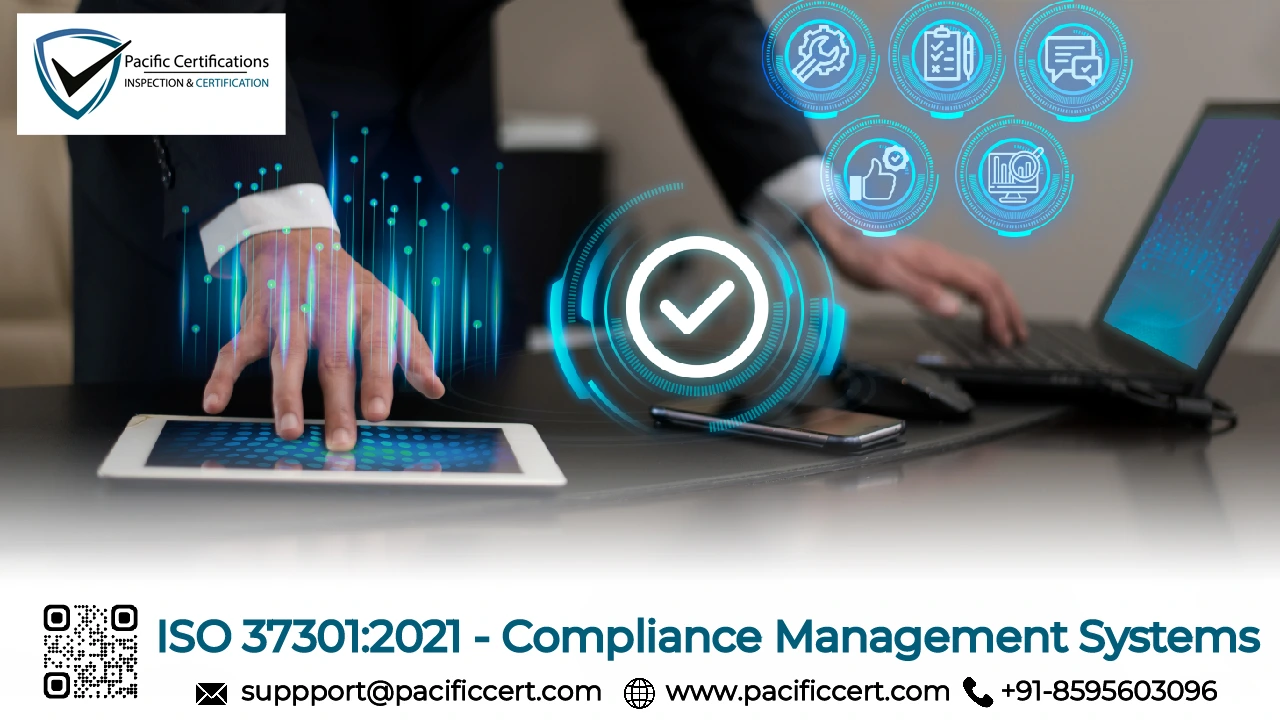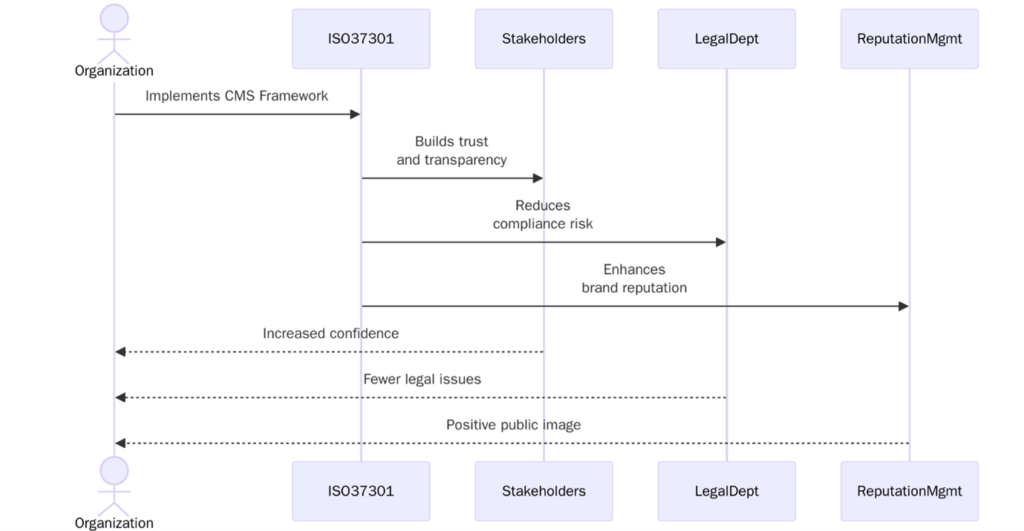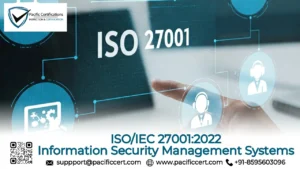What is ISO 37301?

ISO 37301 is the internationally recognized standard for compliance management systems (CMS). It provides the requirements and guidance for establishing, maintaining and improving a CMS within an organization. It helps to ensure that an organization meets its compliance obligations, including legal, regulatory, industry and internal policies.

Replacing the earlier ISO 19600:2014, ISO 37301 provides a structured and auditable framework for organizations to prevent misconduct and manage compliance risks effectively. The standard is aligned with Annex SL, making it compatible with other ISO management systems like ISO 9001, ISO 27001 and ISO 45001.
Need help getting started with audit or certification? Contact us at support@pacificcert.com!
Scope and Applicability
ISO 37301 is applicable to organizations of all types, sizes, and sectors, public or private, for-profit or nonprofit. It can be implemented across:
- Corporations and multinational companies
- Government agencies and regulators
- Financial institutions and insurance providers
- Healthcare and pharmaceutical companies
- Educational and research institutions
The standard supports organizations in creating a transparent and legally compliant operating environment. It is particularly relevant for sectors facing increasing regulatory oversight or stakeholder expectations around ethics and compliance.
Want to assess whether ISO 37301 fits your business? Reach out to us at support@pacificcert.com!
ISO 37301 Certification Process
The ISO 37301 certification process involves a structured series of activities aimed at aligning your organization’s practices with compliance management requirements.
Key Steps:
- Gap Assessment – Evaluate your existing compliance framework against ISO 37301 requirements.
- Compliance Policy Development – Draft or refine your compliance policy and program structure.
- Implementation – Train staff, assign responsibilities, implement controls, and roll out communication plans.
- Monitoring & Evaluation – Establish performance indicators, internal audit mechanisms, and incident reporting systems.
- Management Review – Conduct strategic reviews to assess effectiveness and risk alignment.
- Third-Party Audit – An accredited certification body (such as Pacific Certifications) will audit and certify your CMS.
Our team supports you from planning to certification audit, write to support@pacificcert.com!
How to Implement ISO 37301 in Your Organization?
To successfully implement ISO 37301, an organization should:
- Establish top management commitment to compliance culture.
- Identify internal and external compliance obligations and risks.
- Develop a compliance framework with clearly defined roles and procedures.
- Communicate expectations through policies, codes of conduct, and training.
- Implement whistleblower mechanisms and anti-retaliation safeguards.
- Monitor compliance using audits, incident logs, and key metrics.
- Review performance regularly and continuously improve your CMS.
We at Pacific Certifications offer customized ISO 37301 certification roadmaps to suit your organization’s size and risk exposure. Contact support@pacificcert.com for more details!
Documentation Required
Key documents and records under ISO 37301 include:
- Compliance policy and objectives
- Compliance risk assessment reports
- Roles and responsibilities (e.g., Compliance Officer)
- Legal and regulatory register
- Communication and training records
- Breach reporting and incident management logs
- Performance metrics and KPIs
- Internal audit and management review records
To get started with your certification process, please contact us at support@pacificcert.com.
Eligibility Criteria
Any organization aiming to enhance governance and integrity is eligible to implement ISO 37301. Ideal candidates include:
- Organizations with complex legal/regulatory landscapes
- Entities seeking certification for tender or partnership eligibility
- Businesses wanting to integrate compliance with their ISO 9001, ISO 27001, or ISO 45001 systems
- Institutions managing third-party risk, anti-bribery, or ethics compliance programs
If you’re unsure whether your organization qualifies or is ready, reach out to support@pacificcert.com!
ISO 37301 Certification Cost
The cost of ISO 37301 certification cost depends on several factors:
- Size and structure of the organization
- Number of departments, locations, or operational units
- Complexity of compliance obligations and legal frameworks
- Training, awareness, and audit preparation needs
- Level of integration with other ISO management systems
We provide tailored cost estimates based on a scoping consultation. Contact us at support@pacificcert.com!
Certification Timeline
Week | Activities |
Week 1 | Compliance gap analysis and scoping |
Week 2 | Development of compliance policy and governance framework |
Week 3 | Risk assessment and stakeholder engagement |
Week 4 | Training rollout and internal controls implementation |
Week 5 | Internal audit and management review |
Week 6 | Third-party audit and final certification |
Need help organizing your certification project plan? Email support@pacificcert.com.
ISO 37301 Requirements
ISO 37301 sets out a comprehensive structure for managing compliance obligations, which includes:

- Context of the Organization: Understanding compliance-related risks, laws, and stakeholder expectations.
- Leadership and Governance: Assigning top-level responsibility, defining roles (e.g., Compliance Officer), and fostering a compliance culture.
- Planning: Identifying legal, regulatory, contractual, and voluntary compliance requirements.
- Support: Ensuring communication, training, and resource availability.
- Operation: Implementing controls, reporting systems, and compliance procedures.
- Performance Evaluation: Monitoring compliance outcomes, conducting internal audits, and reviewing objectives.
- Improvement: Taking corrective actions and enhancing CMS based on audit findings and performance data.
Let us help you turn these requirements into actionable procedures, contact us at support@pacificcert.com.
What are the Benefits of ISO 37301?
- Ensures systematic identification and fulfillment of all applicable legal and regulatory requirements.
- Demonstrates transparency and accountability, enhancing confidence among regulators, clients, and partners.
- Minimizes legal exposure through proactive compliance management and timely corrective actions.
- Improves internal governance by establishing controls, procedures, and oversight mechanisms.
- Encourages ethical conduct, integrity, and whistleblower protection throughout the organization.
- Enables informed decisions by aligning compliance risks with organizational goals.
- Helps multinational organizations meet cross-border regulatory expectations.
- Follows the same structure as ISO 9001, ISO 27001, and ISO 45001, enabling integration.

The rise in regulatory scrutiny, cross-border data sharing, ESG expectations, and corporate governance reforms have made compliance a board-level priority. A PwC compliance benchmark survey revealed that 68% of organizations globally are strengthening their compliance frameworks using ISO-based systems.
Whether driven by regulation, risk, or reputation, ISO 37301 is now considered a global best practice for managing organizational compliance.
Want to position your compliance program at a global standard? Contact us at support@pacificcert.com!
How Pacific Certifications Can Help?
We at Pacific Certifications offer comprehensive support for:
- ISO 37301 gap analysis and readiness assessments
- Audit and certification
- Accredited certification
- Surveillance audits
- Ongoing assistance
Our auditors and compliance experts work across industries, helping organizations achieve and maintain ISO 37301 certification with confidence.
Let’s build a strong compliance system for your organization. Email us at support@pacificcert.com!
FAQs on ISO 37301
Is ISO 37301 certifiable?
Yes, unlike ISO 19600, ISO 37301 is designed for third-party certification.
Can small businesses implement ISO 37301?
Absolutely. The standard is scalable to organizations of all sizes.
Is ISO 37301 the same as ISO 37001?
No. ISO 37001 focuses on anti-bribery. ISO 37301 addresses broader compliance obligations.
Can it be integrated with other standards?
Yes, it aligns with ISO 9001, ISO 27001, ISO 14001, and ISO 45001.
What industries benefit most?
Finance, healthcare, pharmaceuticals, government, and tech are among the top adopters.
Ready to get ISO 37301 certified?
Contact Pacific Certifications to begin your certification journey today!
Suggested Certifications –
Read more: Pacific Blogs






